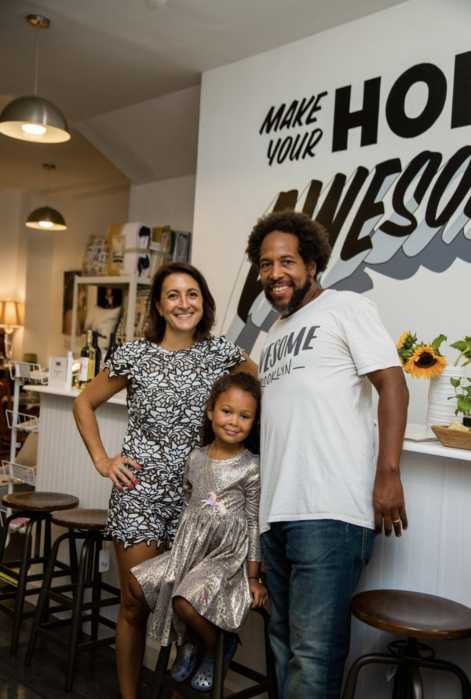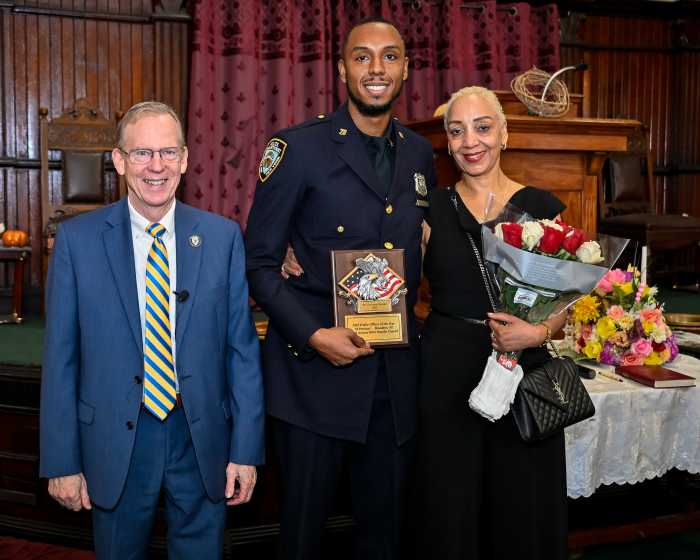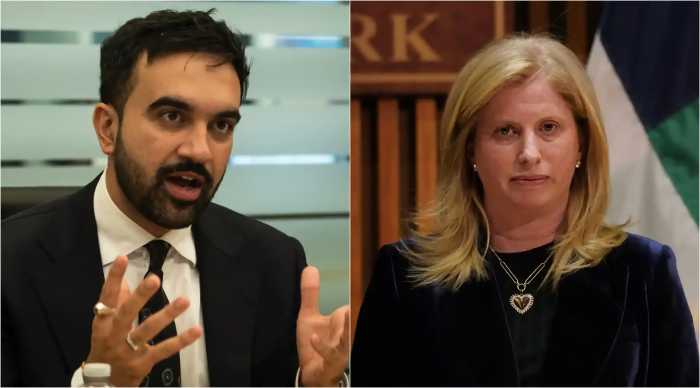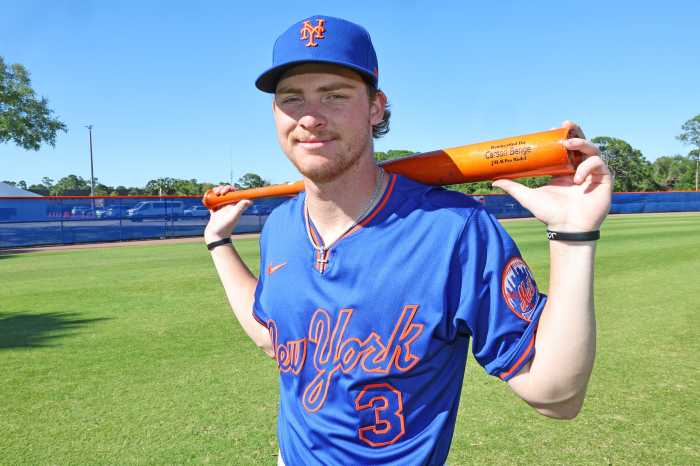William Bowen, found guilty in harassment, stalking case, sues plaintiff, AVP
Chelsea Confrontations
Jay Gurewitsch; mug shot of Billy Bowen.
William “Billy” Bowen, 42, convicted numerous times during the past decade on misdemeanor assault, harassment, and larceny charges, some against gay men in Manhattan, has been sentenced to ten months in prison in connection with his latest conviction on aggravated harassment and stalking charges.
According to Thomas Shanahan, a gay civil rights attorney representing Gurewitsch, two weeks before Bowen’s criminal case went to trial, the defendant filed a civil suit naming Gurewitsch, the other Arcadia staff member who had encountered Bowen, several other gay men who had made complaints against Bowen, and the New York City Gay and Lesbian Anti-Violence Project (AVP), which over the years has posted flyers and taken other steps to alert the community about Bowen’s history.
Bowen’s lawsuit alleged that this group of plaintiffs engaged in a malicious prosecution, a civil conspiracy, and the intentional infliction of emotional distress. Both Shanahan and Gurewitsch said the lawsuit against the two men from Arcadia was dismissed because Bowen’s attorney repeatedly missed deadlines for filing motions. Shanahan noted, however, that Bowen’s conviction would have voided any claims of malicious prosecution. He also said that the lawsuit quoted verbatim from the initial witness statements to the police and from the indictment, which he said was “protected speech.”
“You can’t sue for that,” Shanahan said. “This lawsuit was patently lacking in merit.”
Shanahan added that he had asked the judge for attorney’s fees and sanctions against Bowen’s attorney, Eugene Banta, a motion that was declined.
“My opinion was always that the civil suit was an attempt to intimidate me into not testifying in the criminal case,” Gurewitsch told Gay City News. “And it didn’t work obviously.”
Banta said that charges that the civil action was taken to intimidate witnesses were “abs-olutely not true,” that the statements cited in the lawsuit were not taken from the witness statements and indictment, and that comments about Bowen’s conduct are not protected when made “in animus.” While he would not comment on the merits of his client’s lawsuit in specifics, he said the lawsuit against Gurewitsch has to be understand as “part and parcel” of the overall claims against all the civil defendants.
Attorneys for all parties, including the AVP, have been told to report to the chambers of the presiding judge, Roz Richter, on January 7 on Bowen’s motion that the case against Gurewitsch and his employee be re-heard. Richard Haymes, AVP’s executive director, confirmed that Bowen has previously filed at least one other unsuccessful suit against the victims services agency, making similar civil claims.
Bowen was convicted on November 18 on one count of aggravated harassment in the second degree, one count of harassment in the second degree, and one count of stalking in the fourth degree. All three charges are misdemeanors.
According to Gurewitsch, the encounters with Bowen occurred on four successive Saturday nights, beginning on February 8, each time around 8:30 or 9 p.m. as Arcadia was about to close. On the first occasion, Bowen, whom Gurewitsch said he had never met before, arrived with the store otherwise empty, “smelling of alcohol,” walked up to the owner, clasping his hand, and said, “Let’s go into the back and play.” Gurewitsch said that when he “politely declined” what he took to be a sexual advance, Bowen “got really obnoxious and said something to the effect of ‘Your whole community is going down the drain anyway. You all do drugs. You are all going to die.’”
Despite the outburst, Gurewitsch said he “dismissed the whole thing as the rantings of a slightly inebriated person who had just been declined for sex.” When other customers arrived a moment later, Bowen quickly left.
Around the same time the following week, Bowen returned, again when the store was empty, this time grasping Gurewitsch’s hand and not letting it go, in a manner the store owner interpreted to be a play for “physical control and emotional domination.” Gurewitsch, who is 6 ft.-3 in., but very lean at 170 pounds, estimated that Bowen, though a few inches shorter, has a weight advantage of about 50 pounds. When he broke free of Bowen’s grasp, Gurewitsch told him his behavior was inappropriate and that he should not return to the store. Once again, Bowen left as soon as other customers entered the store.
On the third Saturday night, Gurewitsch was temporarily absent from the store when Bowen arrived. When Bowen realized the store owner was not there, he demanded a piece of paper from the Arcadia employee on hand, and, according to police reporters, scrawled, “Your society is going to take the biggest fall,” before slamming the paper down on a desk and exiting. When Gurewitsch returned to the store, his employee was “visibly shaken,” he said. Reading the note, which was signed “Billy Lee,” Gurewitsch realized that the harasser was Bowen, whom he seen on AVP flyers over the years. After confirming that by going to the AVP website, he phoned the police, and also posted a copy of the flyer from the website on his door.
According to Gurewitsch, everyone he encountered at the 10th precinct headquarters was familiar with Bowen, as were many of the merchants and bar owners in the neighborhood whom he contacted.
Bowen was not apprehended until March 8, and Gurewitsch had one last encounter with him about 9 p.m. on March 1. Just as he was closing up, he noticed Bowen making a beeline for the store as is he were “a man on a mission.” The two men, arriving on either side of the door at the same time, struggled for control of the entranceway until Gurewitsch warned Bowen that he had already filed charges and any further aggression would be considered trespassing. The store owner was then able to lock the door, and call the police as well as a close friend nearby who is an attorney and rushed to the scene to watch from a safe distance.
Bowen quickly “flew into a full blown rage,” screaming, “You are doing ecstasy and cocaine. You are selling drugs out of this store for the Black Party. Everyone in this community and in this neighborhood is doing drugs.” According to police reports, Bowen also screamed, “I work with the police. I am an undercover agent for the police. I have been on drug busts before. I have been to those parties and have arrested people there.”
Bowen finally fled when he heard sirens. He was arrested a week later on West 20th Street, just one block above Arcadia, as he began a street altercation––with people handing out flyers warning about him produced by AVP––that attracted the attention of the police. Despite the role of AVP’s flyers in leading to Bowen’s arrest, Gurewitsch voiced dissatisfaction with the agency’s response to his requests for assistance. He said that he may have called the agency’s hotline as early as February 22, the night his assistant was accosted––though he was not certain on this point––and that the initial return call came within half an hour.
However, Gurewitsch said that once he asked that the agency begin distributing its flyers again, things mysteriously slowed down. He asserted that after several phone calls “working up the food chain” at AVP, he was told “the real story”––that Bowen’s earlier lawsuit against the agency had made it skittish, and it was reviewing the contents of the flyer with outside counsel. He said that after a delay he estimated at “one month, but definitely several weeks at least,” AVP began distributing the same flyer it had always used.
The chronology of Bowen’s arrest, however, suggests that there could not have been too long a delay in the agency’s response. The earliest Gurewitsch contacted AVP by his own account was February 22 and Bowen was apprehended on March 8, 14 days later.
Haymes was adamant that any legal vetting done by the agency could only have taken a day or two, and more generally said that no civil action taken against AVP has ever hampered its client advocacy.
According to Diane Dolan-Soto, AVP director of client services, the sort of alerts the agency issued in the case of Bowen are critical.
“I think that people need to be aware that there are people who prey on our community,” she said. “We need to do everything we can to be protective of members of our community. If we get complaints about a perpetrator and there is a public record out there on which we can rely, we need to let people know he is out there.”
According to Dolan-Soto, AVP has received 69 complaints about Bowen since it began computer storage of its records in 1995. A 2002 AVP flyer said Bowen had pled guilty nine times since 1995––four times to third degree assault, once to attempted assault, twice to petit larceny, once to reckless endangerment, and once to second degree menacing.
According to Sherry Hunter, a spokesperson for the Manhattan district attorney’s office, Bowen was convicted “roughly a dozen times” between 1993 and 2001 on misdemeanor charges in New York County, including throwing a telephone at an arresting police officer who was giving him an opportunity to make his one call.
We also publish:














